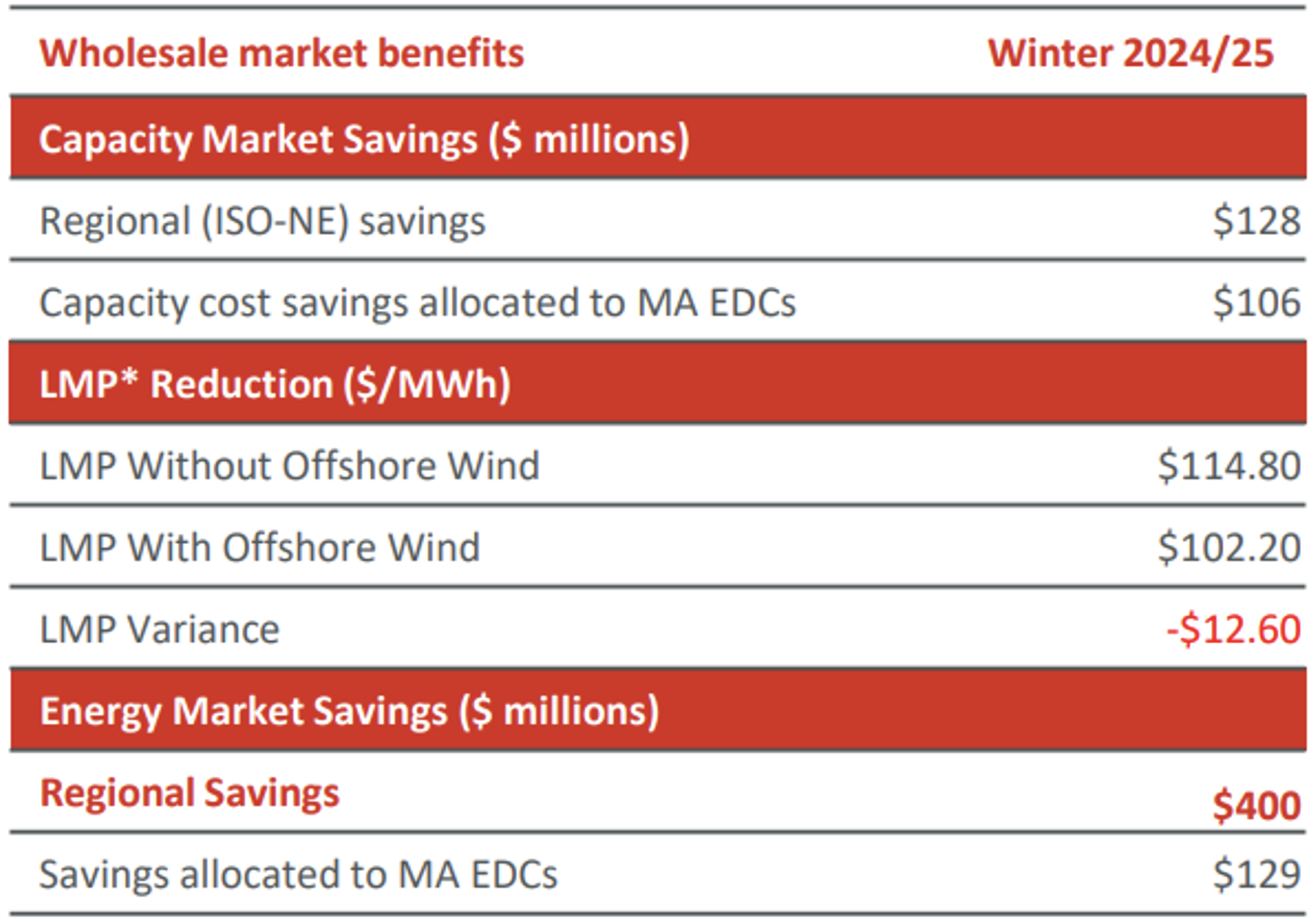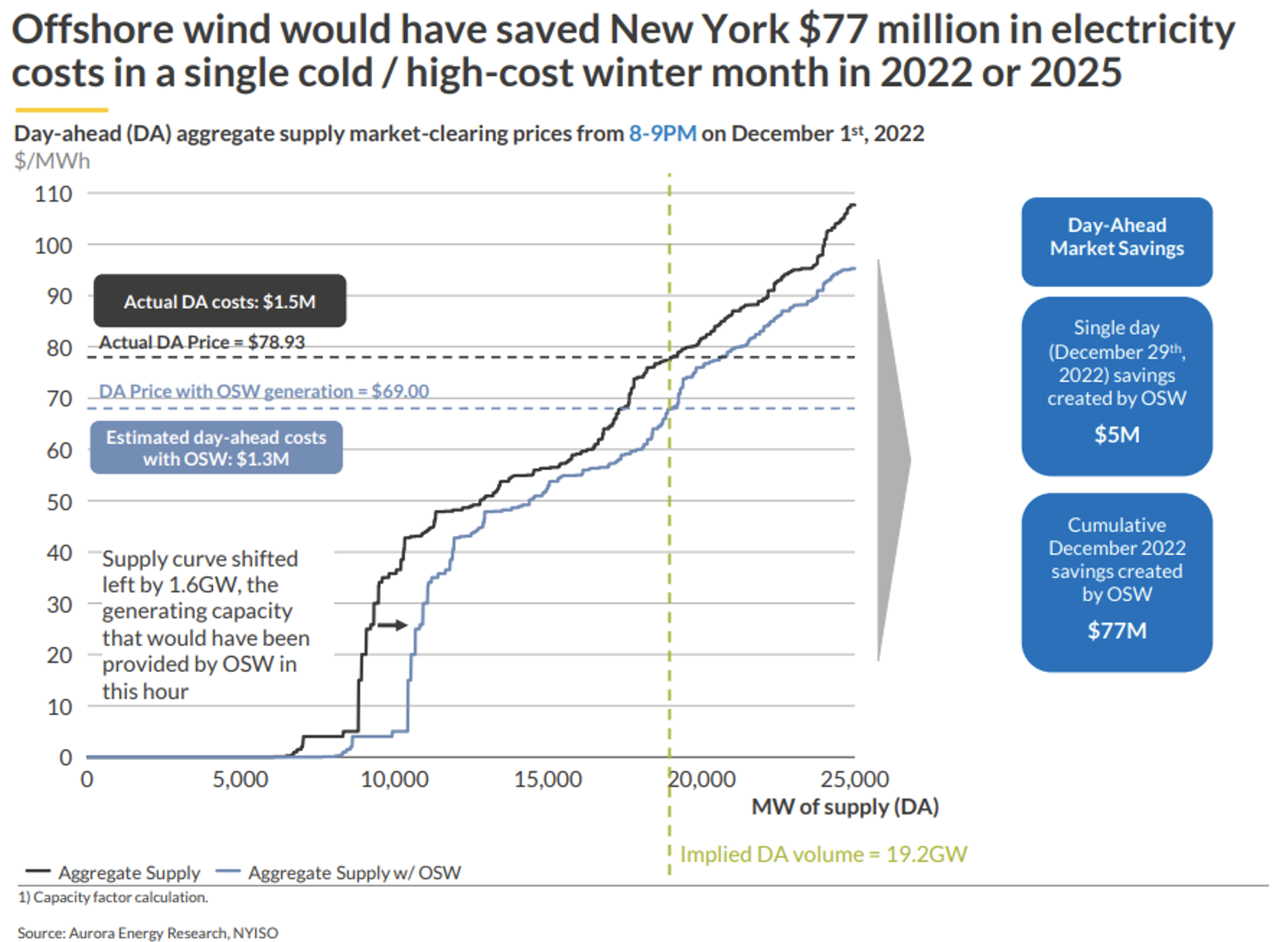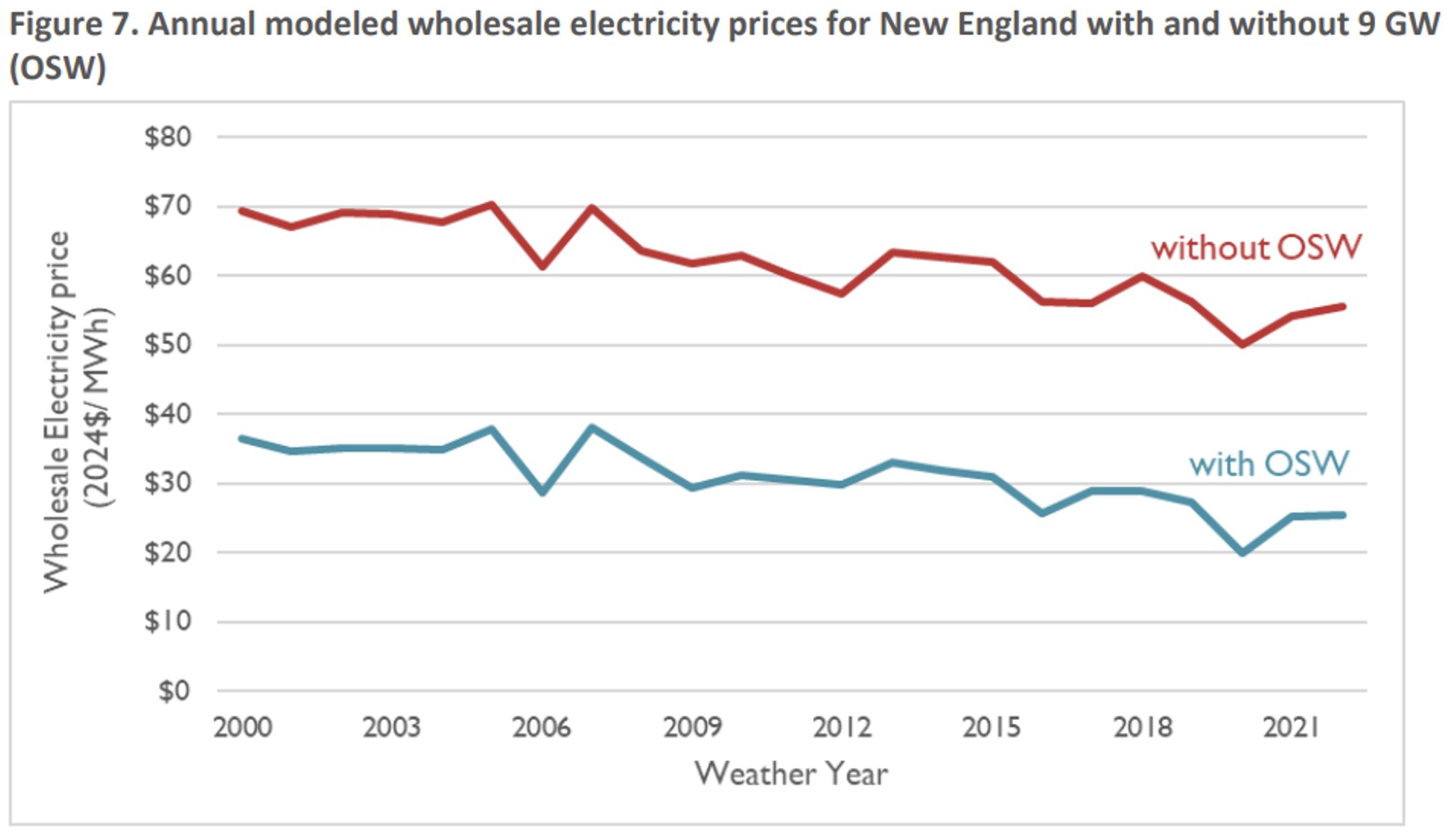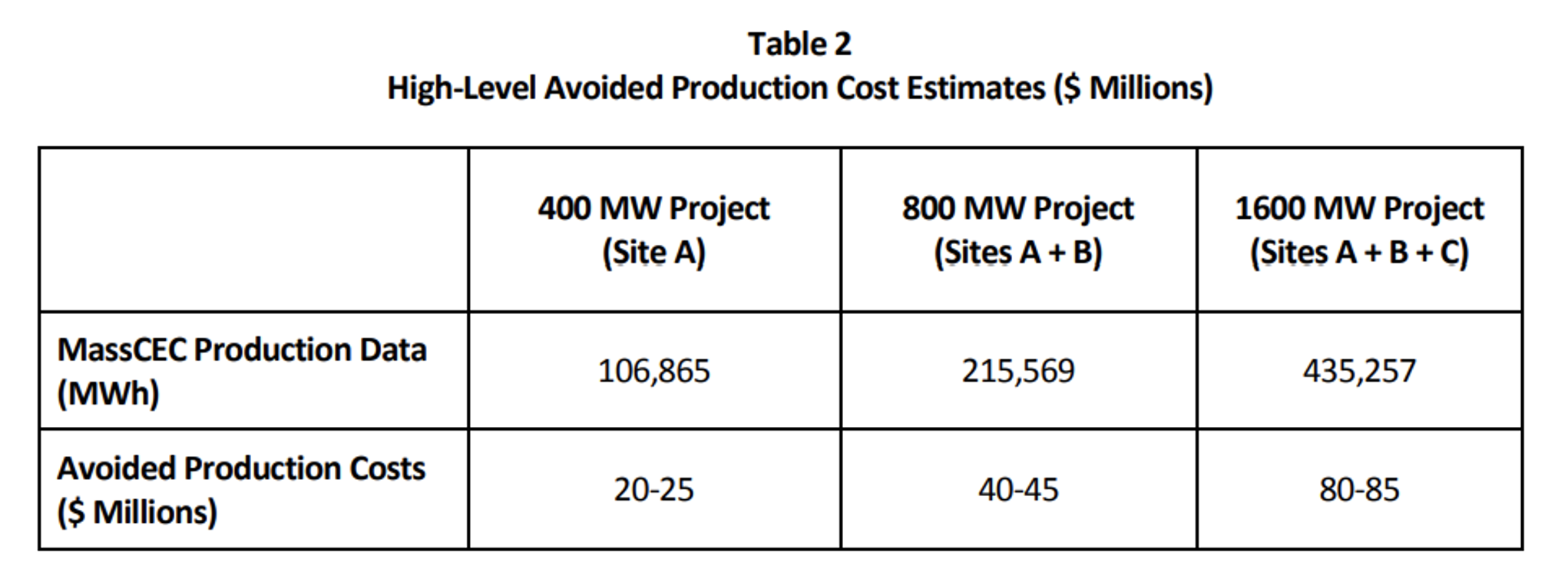CT, RI sue over federal offshore wind work orders
Connecticut and Rhode Island are suing the Trump administration over orders to halt work on offshore wind developments.
The federal orders demand work cease on Revolution Wind, located off the Rhode Island coast. It is expected to power 350,000 New England homes and if construction continues unabated, it would be operational by next year.
Jamie Dickerson, senior director of climate and clean energy programs at the Acadia Center, said the work stoppage could raise consumer costs.
“The projects, as they were supposed to come online, would have substantially hedged the region against those volatile winter fuel costs,” Dickerson explained. “Because the offshore wind contracts are at a fixed price, it reduced the amount the region would otherwise have to pay for more expensive fossil fuels.”
A new study showed offshore wind has the potential to save New England residents $400 million a year in energy costs. It comes as Connecticut has the third-highest electricity costs nationwide. The federal action also halts grants for ports to be developed into offshore wind ports. Bridgeport will lose a $10.5 million grant allocated in 2022 for the construction of an operations, maintenance and wind facility.
The effects of the federal order go beyond ratepayers’ cost, affecting state economies as well. Connecticut and Rhode Island saw an additional 1,200 jobs from the Revolution Wind project. Dickerson pointed out not just about the jobs at the port but indirect jobs stemming from the burgeoning industry.
“The fishermen and the mariners, and the navigators who have been benefiting from the ripple effect investments of these offshore wind project developments, shuttling workers to and from ports to the staging facilities and the vessels offshore,” Dickerson outlined.
Studies have shown Connecticut has significant potential for being a hub for the offshore wind supply chain. Aside from the federal challenges, the state has shown some wavering commitment to clean energy. Gov. Ned Lamont pulled Connecticut from a multistate offshore wind deal last year and a natural gas pipeline expansion is being given preliminary approval.
To read the full article from Public News Service, click here.
Editorial: Healey concedes natural gas’ key role in energy mix
When it comes to energy supplies, the corner office — at least for the time being — has chosen economic pragmatism over ideology.
Gov. Maura Healey signaled that shift by expressing her support for Eversource Energy’s proposal to lock in more natural gas for Massachusetts, a sign that at least one official in her administration sees fossil fuel continuing as an integral component of the state’s energy mix.
Nonetheless environmental advocates said regulators should carefully weigh whether more gas infrastructure is warranted.
“Acadia Center is reviewing the proposed pipeline expansion project, which responds to the task given to gas utilities by the DPU to phase-out reliance on Everett Marine Terminal,” the group said in a statement.
“Phasing-out reliance on EMT should be done first with all available clean energy solutions, rather than with expanded gas pipeline supply.”
To read the full article from the Lowell Sun, click here.
Revolution Wind developer sues Trump administration over stop-work order
Less than two weeks after the Trump administration issued a stop-work order for Revolution Wind — a large and nearly complete wind farm off the coasts of Massachusetts and Rhode Island — the company behind the project, is pushing back.
Ørsted, one of the largest offshore wind developers in the world, sued the administration in U.S. District Court for the District of Columbia on Thursday. In its complaint, the company called the stop work order “unlawful,” claiming it “lacks any evidentiary basis” and was issued “without statutory authority.”
“We didn’t believe these actions taken by the president were lawful, and I’m really glad to see Ørsted pushing back heavily,” said Kyle Murray, Massachusetts program director at the Acadia Center, a clean energy research and advocacy nonprofit. “Hopefully this lawsuit will prevail.”
To read the full article from wbur, click here.
CT’s Latest Climate Report Shows Emissions in 2023 Decreased in the Two Largest Sources of Climate Pollution: Transportation and Buildings
(HARTFORD) — The Connecticut Department of Energy and Environmental Protection (“DEEP”) published its latest Greenhouse Gas (“GHG”) Emissions Inventory, a comprehensive documentation of Connecticut’s air pollution that contributes to climate change. DEEP has issued this report since 2003, and also now in accordance with Public Act 25-125, signed into law by Governor Lamont earlier this month.
“Connecticut deserves credit for tracking emissions as the state works to meet clear, scientifically driven goals to reduce climate pollution” said Daniel Sosland, president of Acadia Center. “Acadia Center thanks DEEP for making emissions information publicly available, allowing the state and stakeholders to see where progress is being made and better adjust to challenges in the effort to build a clean energy economy. Addressing climate is essential to positioning Connecticut for a stronger economic future, reducing energy costs, and making needed improvements in housing and transportation that will improve the quality of life in its communities.”
To read the full article from the Connecticut Department of Energy & Environmental Protection, click here.
Healey backs natural gas transmission project
STATE HOUSE, BOSTON, SEPT. 3, 2025…..Gov. Maura Healey signaled support for Eversource’s proposal to lock in more natural gas for Massachusetts, offering an indication she sees the fossil fuel as an important part of the state’s energy mix even as her administration presses forward with longer-term climate goals.
Environmental advocates said regulators should carefully weigh whether more gas infrastructure is the right path. “Acadia Center is reviewing the proposed pipeline expansion project, which responds to the task given to gas utilities by the DPU to phase-out reliance on Everett Marine Terminal,” the group said in a statement.
“Phasing-out reliance on EMT should be done first with all available clean energy solutions, rather than with expanded gas pipeline supply.” The group also cautioned against long-term risks to consumers. “By doubling down on gas, Massachusetts and the region risk locking consumers into deeper and more expensive fuel cost exposure that will keep ratepayers paying higher bills for decades longer,” Acadia Center said.
To read the full article from State House News, click here.
Statement on Trump Administration Offshore Wind Orders
Contact: Jamie Dickerson – Senior Director, Climate and Clean Energy Programs; jdickerson@acadiacenter.org, 401-276-0600 x102
Acadia Center issued the following statement on the latest actions by the Trump Administration against offshore wind. This is a developing story.
Offshore wind stoppages from the Trump Administration will drive up consumer costs, jeopardize grid reliability, and kill thousands of good-paying jobs
Actions will make energy more costly, less reliable, and more polluting
“Actions taken by the Trump Administration to halt critical offshore wind projects and port infrastructure along the east coast will increase utility bills for families and businesses by hundreds of millions of dollars annually, jeopardize reliable power, and kill thousands of good-paying, union jobs,” said Jamie Dickerson – Senior Director, Climate and Clean Energy Programs at Acadia Center. These stoppages and withdrawn grants will make energy systems more vulnerable to extreme weather events, wreak further damage on federal-state energy system planning and collaboration, and erode investor confidence and market stability – undermining future investment in urgently needed grid infrastructure. From any point of view, halting work on established wind projects that states energy officials are relying on to meet power needs, clean the air, and reduce system costs defies the facts and simply makes no sense.
The August 29 announcement withdrawing and cancelling significant offshore wind port infrastructure funding comes just one week after the stop work order halting progress on the 80% complete Revolution Wind project, which was slated to begin delivering 700 MW of power to Connecticut and Rhode Island in 2026. Other affected port projects in the northeast include those in: Bridgeport, CT ($10.5m); Paulsboro, NJ ($20.5m); Quonset, RI ($11.2m); Staten Island, NY ($48m); and Salem, MA ($33.8m). Without investment in these critical port facilities, the region’s economy and infrastructure will be severely damaged. Further reporting now indicates the Trump Administration may also reconsider previously approved permits for SouthCoast Wind, serving Massachusetts.
Last week, a new study conducted by Daymark Energy Advisors on behalf of RENEW Northeast, found that offshore wind would have saved New England ratepayers at least $400 million in utility bill costs last year, lowering energy market prices by 11% and insulating ratepayers from expensive, volatile natural gas. Today, the grid is dangerously over-reliant on natural gas, which provides over 50% of electricity generation in New England. This overreliance costs ratepayers dearly, with volatility in natural gas prices imposing an extreme burden on ratepayers: on average, the region spends around $3 billion per year on natural gas for power generation, and recently, the region saw a 67% price increase between 2024 and 2025 due to a 112% jump in the price of natural gas (see: ISO New England report). Offshore wind is an effective hedge against this volatility, provide sorely needed on-peak production, and reducing fuel-burn to keep supplies available and replenished during extended cold-snap periods.
The bottom line: analysis after analysis provides compelling evidence that offshore wind will lower utility bills for households in New England and the Northeast. Acadia Center calls on policymakers and stakeholders to hold the Trump Administration accountable for the direct financial harms these project delays and stoppages have and will continue to inflict on families and businesses across the region.
Highlights of this and previous studies on offshore wind and energy affordability include:
Daymark Energy Advisors (August 2025):
Offshore wind would have lowered wholesale energy prices by 11%, saving ratepayers roughly $400m in Winter 24/25.
Under most conservative assumptions additional capacity from OSW would have reduced regional capacity market costs by at least $128 million.
Net bill impact for average residential customers of $1.32 to $2.68/month in savings, even under most expensive PPA scenarios.
Aurora Energy Research (May 2025):

Offshore wind would have saved New York $77 million in electricity costs in a single cold/high-cost winter month in 2022 or 2025.
In analysis of real market conditions in December 2022, study concluded that Empire Wind, Sunrise Wind, and South Fork Wind Farm would have saved New York $77 million.
Even higher wholesale prices in January 2025 would mean even higher savings likely greater than $80m.
Synapse Energy Economics (June 2024):

Nine GW of OSW by 2030 would reduce New England electricity bills by approx. $630 million to $1.7 billion annually under mid and high gas price scenarios, reducing customer bills by $2.79 to $4.61/month.
Would halve region’s spends on natural gas for power gen. (~$3b annually), help region retain $1.57 billion otherwise flowing out of region.
ISO-NE and MassCEC (December 2018):

Over a 16-day cold-snap period, 400 to 1,600 MW of offshore wind would have yielded $20 to $85m in avoided power production costs.
Production would have reduced day-ahead locational marginal prices (LMP) by 4% to 13%.
Q&A with Acadia Center’s 2025 Fellows
Domingo Cortinez, Roger E. Koontz Fellow in Law and Climate Policy

Who are you?
I’m Domingo Cortinez, a rising second-year student at Yale Law School. I am involved with the Community and Economic Development Clinic, the Yale Environmental Law Students Association, and serve on the executive board of La Sociedad of Latine Law Students.
What brought you to Acadia Center?
I took energy law this past semester and that class really opened my eyes to how much good work there is to be done in the energy space— spanning everything from decarbonization to consumer protection through lower costs and better reliability. Acadia Center’s leadership in this space made the legal fellowship an incredible opportunity to learn about the intricacies of grid advocacy while contributing to real, tangible improvements to our grid system.
Can you describe the scope of the work you’ve done this summer?
I’ve been doing legal research around creating an independent transmission monitor in New England which would review costs for an increasingly problematic form of transmission investment—asset condition projects. These projects represent a staggering 93% of transmission investment, yet they exploit a massive regulatory loophole that lets utilities skip the competitive oversight required for virtually all other grid investments. My work has involved analyzing federal and state regulatory authority over these transmission investments, examining case law on RTO oversight, and developing structural models for an independent entity that could ensure that these massive investments actually serve consumer interests rather than just utility profits.
What interested you about that particular issue/project?
While transmission is incredibly important for improved reliability and the decarbonization of our grid, the vast majority of current investment is going towards costly rebuilds or rehabs of old lines rather than the bigger and more interconnected projects which New England requires for our future grid. Helping to envision a transmission monitor that would better serve the interests of consumers really peaked my interests—it’s hard to imagine any solution which, if structured correctly, can lead to cheaper energy, a more reliable grid, and a more sustainable future—but this project is helping to do exactly that.
What did you find most challenging about the project?
The most challenging part was simultaneously developing expertise in regulatory law and understanding how the energy industry actually works in the day-to-day—from initial project development through regulatory approval to final construction. Connecting legal concepts to real-world industry practices required mastering two very different fields but finding that nexus between law and practice is exactly what made the research rewarding.
What do you wish people understood about your area of interest/studies?
I wish people understood that energy regulation, while technical, directly determines whether families can afford their electric bills, whether the lights stay on, and whether we can achieve our climate goals. The biggest misconception I see is that environmental and economic interests are at odds, but proper regulation can deliver cheaper energy, better reliability, and faster decarbonization simultaneously. Our current framework just creates these perverse incentives that benefit utilities at the consumers expense, but closing regulatory loopholes can unlock billions in savings while accelerating clean energy. This work matters for everyone’s daily life and our shared future.
How has your experience at Acadia Center transformed your views on a specific energy topic or climate in general?
Before Acadia Center, I thought climate action and consumer affordability were often in tension—that going green meant higher costs for families. My fellowship showed me that the opposite is true when policy is designed correctly, as I saw how proper regulatory oversight could simultaneously lower energy bills, improve reliability, and accelerate decarbonization. My fellowship taught me that the biggest barrier to a clean energy future isn’t cost or technology—it’s poorly designed policies that fail to align environmental and economic interests.
What’s the biggest lesson you’ve learned over the course of your fellowship?
The most valuable lesson I’ve learned is just how important it is to structure incentives properly, so that all grid actors are doing what’s good for consumers and the public interest rather than just maximizing their own profits. When incentives are misaligned, you get exactly what we see today—expensive infrastructure rebuilds that benefit utilities financially but don’t serve the broader goals of affordability, reliability, and sustainability.
Eres David, Data Analysis Fellow

Who are you?
Hi! I’m Eres David, a rising Junior at Columbia University studying Earth and Environmental Engineering.
What brought you to Acadia Center?
I was introduced to Acadia Center through the Black Girl Environmentalist (BGE) Hazel M. Johnson Fellowship. Through the fellowship, I was able to apply to climate-focused companies and organizations partnered with BGE and in researching my options, Acadia Center really stood out to me!
Please describe the scope of the work you’ve done this summer.
This summer, I evaluated two drivers of rising energy costs in New England: natural gas price volatility and natural gas infrastructure capital investment. My work included analysis of the price of natural gas sold to electricity generators and wholesale electricity prices as well as researching gas infrastructure programs in New England and collecting data on spending and revenue requirements.
What interested you about that particular issue/project?
It was particularly interesting to learn how gas infrastructure replacement and expansion programs use money for spending that contradicts decarbonization goals for several decades, even after the programs have been phased out. Not only could this spending be allocated to renewable energy investments, but these costs also end up being offset by ratepayers and utility customers!
What did you find most challenging about the project?
Finding expenditure data for the gas infrastructure programs was very challenging. A lot of these spending figures were buried in documents and reports that were difficult to find and decipher. I was fortunate to have help from other members of the team to find some of these documents and find the values I needed.
What’s the biggest lesson you’ve learned over the course of your fellowship or internship?
My experience at Acadia Center has opened my eyes to the vast intricacies of advocating for clean, affordable energy at the regional level. I was unaware of the processes that went into energy policy advocacy and the numerous uses for data like that which I analyzed this summer.
What do you wish people understood about your area of interest/studies?
I wish people understood how important clear, succinct communication is. In order to advocate for clean, affordable energy that is equitably accessible, the research we do and the data we collect has to be “translated” effectively. Politicians, scientists, community members, and anyone else who affects or is affected by energy policy should be able to easily interpret our findings.
Mia Ambroiggio, Environmental Justice and Outreach Fellow
Who are you?
My name is Mia Ambroiggio, and I am currently a summer fellow with Acadia Center. I’m a graduate student at the Yale School of the Environment, pursuing a Master of Environmental Management with a specialization in People, Equity, and the Environment. My interests center on community resilience to climate threats, with a particular focus on coastal and disaster resilience.
What brought you to Acadia Center?
I was placed with Acadia Center through my fellowship program—the Yale Environmental Fellows—and I couldn’t be more excited. With a background in resilience work across government scales in Maine, I recognized energy as a personal knowledge gap. This role with Acadia Center has given me the opportunity to explore the energy space and its connection to resilience in an applied context, while also learning from the deep expertise of Acadia’s staff on the clean energy transition.
Can you explain the scope of the work you’ve done this summer?
This summer, I explored the role of Distributed Energy Resources (DERs) in enhancing community resilience, particularly in response to outages caused by extreme weather events. I conducted interviews with municipalities and community organizations across the Northeast to understand the current DER landscape: what projects are completed or underway, useful resources, and common barriers across communities. Insights from these conversations shaped a practical toolkit designed to help communities interested in pursuing DER projects. The toolkit features clear, accessible language, a glossary of DER-related terminology, and a resource directory to help communities find technical assistance, funding, and opportunities for knowledge sharing and collaboration.
What interested you about that particular issue/project?
As climate change increases the frequency and severity of extreme weather events, this work feels extremely pressing. Ensuring that communities— especially those at heightened risk due to being rural, coastal, or on an island— have the information, funding, and infrastructure to maintain power and critical services during outages or disruptions to the larger grid is incredibly important to the preparedness and health of the community. Additionally, with a background in writing and community engagement, translating jargon-heavy energy topics into plain language so they can reach and resonate with a wider audience is always of interest to me!
What did you find most challenging about the project?
Energy is extremely complex! Although the pursuit of Distributed Energy Resources seems intuitive due to their many benefits, there are many complications that we have created within our larger energy system that inhibits this work, and therefore inhibits community resilience. To successfully achieve clean energy solutions that benefit communities, consistent collaboration and cooperation is needed.
What’s the biggest lesson you’ve learned over the course of your fellowship or internship?
Although universal themes emerge in terms of the barriers and benefits of community energy projects, this work is — and should be — deeply place-based. Every community has its own relationship to place, unique challenges, and distinct priorities. While large quantitative datasets are valuable, community-led conversations and relationship-building are essential to ensuring the work remains truly relevant to local needs.
What do you wish people understood about your area of interest/studies?
Community resilience is all-encompassing—from borrowing an egg or a cup of flour from a neighbor to maintaining large-scale energy infrastructure. The strength of a community’s connections—to each other, to local government, and to essential services—ultimately determines how well it can withstand increasing climate risks
Advocacy Win: DPU Halts Gas Line Extension Subsidies, Saving Customers Millions
On August 8th, the Massachusetts Department of Public Utilities (DPU) issued Order 20-80-E, closing a decades-old loophole that forced everyday gas customers to subsidize new fossil fuel hookups, costing ratepayers $160 million in 2023 alone ($9,000 per customer). The average cost of adding new customers was rising, specifically, 50 percent between 2020-2021 and another 50 percent in 2022-2023.
This order was the latest from DPU docket 20-80, the “Future of Gas” docket investigating the future role of natural gas in Massachusetts as the Commonwealth works to achieve its climate mandates and address energy affordability. So far, the DPU has issued a number of impressive orders in this docket that have begun to transform the role of natural gas in Massachusetts and finally curtail its expansion.
This victory is a good example of how coordinated advocacy, grounded in data analysis, can shape precedent-setting regulatory outcomes. In April of this year, Acadia Center and Rewiring America co-authored group coalition comments that were generally supportive of the draft gas line extension policy but also contained specific recommendations for how to make the policy stronger. For example, the draft policy mentioned exception criteria projects would need to meet to receive a line extension subsidy, including one criterion describing how the project must have “….no feasible alternatives to the use of natural gas, including electrification.” In our comments, we argued “feasibility” should be defined as “technical feasibility” (a subtle yet crucial distinction), and the DPU agreed with us in their final decision, limiting allowances to projects that could prove there was no technically feasible alternative to natural gas in their specific building. How do we know we helped shape the outcome? Our letter was cited 18 times throughout the DPU’s decision.
The order in DPU 20-80-E is about “Practices for Line Extension Allowances and Contributions in Aid of Construction for Gas Local Distribution Companies.” Put simply, it essentially looks at who should pay the costs associated with expanding gas service into new areas. Because the cost of gas infrastructure is extremely expensive, these costs had previously been borne mostly by existing ratepayers, with the understanding that the addition of the customer would pay for itself in the long term. However, forward-looking projections show this would no longer be the case.
In practice, prior to this most recent decision, existing gas customers paid a disproportionate share of the costs for bringing new gas customers online. Since 2018, existing gas customers have footed the bill for 80 percent of all new gas customer connections — and these subsidies have driven up gas bills for everyone. In terms of projected future costs, according to a recent earnings report from Eversource, the company projects that its gas distribution costs across New England will increase 83 percent between 2023 and 2029, faster than either its electric transmission or distribution subsidiaries. A separate analysis commissioned by the Massachusetts attorney general’s office corroborated that a potentially vast and rapid gas system build-out – and associated impacts to ratepayer bills – could occur without state intervention. According to the AG’s analysis, the path we’re currently on could see the state’s gas rate base – the total value of gas system assets on which utilities are allowed to earn a rate of return – jump from $10 to $20 billion in a short span of roughly 10 years.
The old system served as a massive subsidy to natural gas service, and incentivized the expansion of natural gas infrastructure. Massachusetts’ climate plans call for reduced reliance on the natural gas distribution system in the coming years, meaning that the old system of spreading the cost of connecting new gas customers across all customers was directly at odds with our climate plans. Further, with the knowledge that the gas system needs to be wound down, the prior “business as usual” policy would have continued to incentivize gas infrastructure expansion that would end up as stranded costs that all gas customers would be on the hook to pay for far into the future.
While the gas utilities, also known as local distribution companies (LDCs), argued in the docket that existing practices are consistent with state policies, most comments came down on the other side. Thankfully, the DPU overwhelmingly sided with the latter. It ordered the discontinuing of line extension allowances, except in certain instances where alternatives to gas service were simply technically infeasible. Based on the language in the order, we expect proposals for new gas hookups that meet this exception criteria to be very few and far between – for example, potentially some niche industrial customers with no technically viable alternative electric- or propane-based equipment available on the market would meet this exception criteria.
This decision is crucial because the Commonwealth is already facing concerns about energy affordability. Costs associated with the gas system have steadily been rising, and continuing to subsidize new gas hook-ups would have only worsened the situation. This is one more step in reshaping Massachusetts’ energy system, but the fight isn’t over, and other subsidies and misaligned incentives exist for gas infrastructure.
Now that the much anticipated decision around line extension allowances has been resolved, attention among advocates will turn towards the Climate Compliance Plans — the five-year strategic documents that local gas distribution companies (LDCs) must submit under the Future of Gas docket, showing how they plan to meet greenhouse gas (GHG) sublimits, prioritize affordability and equity, and use pilot projects, among other requirements.
RI Energy Seeking to Trim Efficiency Incentives and Rebates for Residents
PROVIDENCE — Environmental groups are warning state officials that proposed cuts to Rhode Island’s energy efficiency programs will raise utility bills, spark inflation, and put residents out of work.
Rhode Island’s energy efficiency programs offer residents a buffet of incentives and rebates aimed at saving on their home energy use. They range from purchasing energy-saving major appliances to weatherizing households to conserve energy.
Emily Koo, Rhode Island program director for the Acadia Center, told council members the budget cuts outlined in the draft plan were a disservice to Rhode Islanders, and that state officials should push back against cuts.
“The original three-year plan cuts in the second draft are a 30% budget reduction,” said Koo. “It will eliminate an estimated $92 million in benefits to all of Rhode Island.”
Koo and the Acadia Center also noted each energy efficiency plan was required to conduct a cost-benefit analysis for each program, and that neither the gas nor the electric program had shown to cost more than the benefits received from the program.
To read the full article from ecoRI, click here.
New report reveals effective solution to avoiding blackouts during 100+ degree days: ‘Something … replicable by other utilities in the country’
As summer temperatures force residents in New England to crank up their air conditioners, the use of solar energy appears to have helped take the heat off regional power grids.
During the dog days of summer, millions of people usually attempt to find relief from the scorching heat in any way that they can. That usually means turning to air conditioning, which can often lead to a surge of electricity usage, sometimes resulting in the occasional regional blackout.
In a recent report from the Acadia Center, the use of behind-the-meter solar likely helped prevent a potential loss of power June 24, when much of the region saw temperatures soar above 100 degrees.
“Five-plus gigawatts of BTM solar helped the region’s power grid ride through one of the hottest days of the year, which tested the grid’s reliability with the highest peak demand in several years,” the report read.
To read the full article from the Cool Down, click here.



















